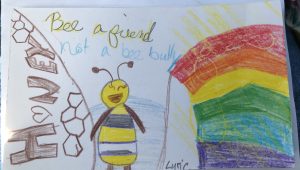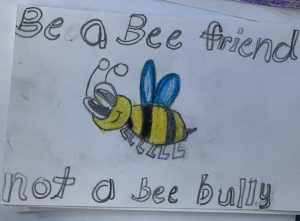Final report for YENC18-124
Project Information
Britt Hopper presented “Bees 101” to introduce the history of the honeybee and its fascinating role as pollinator and honey maker to over 3,000 youth. With educational collaborators, Apiarist Hopper created honeybee handouts to help students retain the information he demonstrated about bees and honey produce. As an aid to their grade level science curriculum, the handouts help classroom educators teach Kansas youth about bee colony collapse, beekeeping, as well as the broader sustainability issues of man’s impact on the environment of the bees and ultimately on our fragile island home—planet Earth. In addition, Hopper Bees website is completed and running; you can see it here: http://beehopper.buzz
By presenting “Bees 101” to youth in schools and community organizations, students will:
- indicate greater awareness of the role and challenges of apiarists and their pollinators;
- take sustainable action to help the bees and ultimately humans by planting prairie perennials and vegetables needing pollination;
- explore keeping bees;
- demonstrate transformative and meaningful understanding of the role bees play in the world and their plight, as well as knowledge of varied careers as apiarists.
Educational & Outreach Activities
Participation Summary:
In the spring 2018, Hopper taught “Bees 101” to regional youth reaching groups ranging from 10-100 students each for a total of just over 3,000 youth. Bees 101 featured a glass bee demonstration hive, lecture demo, flavored honey sticks and Bee Happy handout—all focusing on the three goals of sustainability (Profit over the long term; Stewardship of our nation’s land, air and water; Quality of life for farmers, ranchers and their communities), specific sustainable agriculture practices, and career options.
In May 2018, Hopper worked with existing school hive developed by Hopper at Coleman Middle School, to find and recruit an additional school site to host a new hive. Build and install hive at school site. As of May 2019, Hopper has bee hives at three schools across the city of Wichita.
Learning Outcomes
Through pre and post testing, 90% all 3021 students demonstrated understanding the following SARE indicators:
• greater awareness of the role and challenges of apiarists and their pollinators;
• take sustainable action to help the bees and ultimately humans by planting prairie perennials and vegetables at their houses needing pollination and encouraging their families to avoid pesticides in lawn and garden care;
• explore keeping bees; and
• demonstrate transformative and meaningful understanding of the role bees play in the world and their plight, as well as knowledge of varied careers as apiarists.
The Bees 101 project continues to be in high demand by area school teachers and I have served over 3,000 in the past year. I have also built a second school hive and Wichita, KS now one middle school and one grade school are operating and managing their own hive. I volunteer my time as lead beekeeper. A third school has hives that split when the first hive grew and swarmed. All my students receive honey sticks, but less than half were paid for by SARE. The rest are paid out of my own pocket and I receive no fees or honorarium. This work is just too important to stop. ONLY students in the schools with hives are experiencing hands-on the importance of gardening. Two the schools have established their own pollinator-friendly gardens.
Pre- and Post-tests reported above included additional questions about the bees themselves at varying difficulty for grade levels. For example 1. do you know how your food grows? 2. Do you know what Honeybees do? 3. Did you know that honey has multiple uses? 4. Do know that Honeybees talk to people and dance?
Project Outcomes
I am pleased that more schools have become interested in operating their own hives and creating a "farm to table" learning experience for youth. This extends my presence to a powerful everyday learning about sustainability for bees.


Thank you for your support. It is a challenging job to keep bees alive and active in a sustainable way. Your vision and generosity is helpful for both my work and the children of the Wichita region.